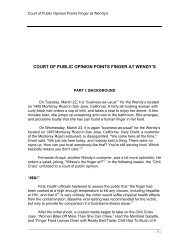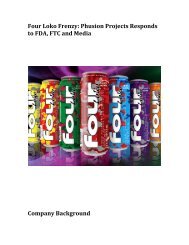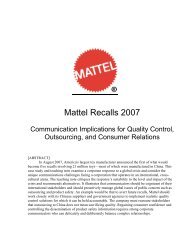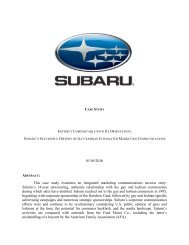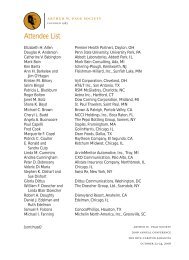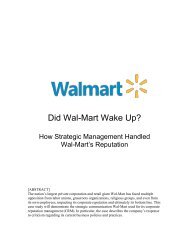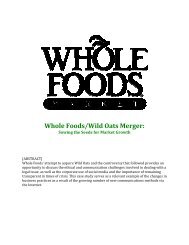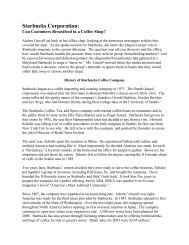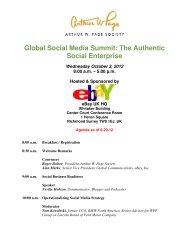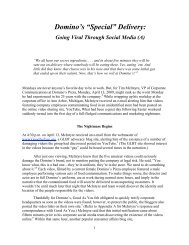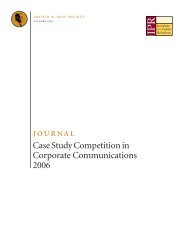McDonald - The Arthur Page Society
McDonald - The Arthur Page Society
McDonald - The Arthur Page Society
You also want an ePaper? Increase the reach of your titles
YUMPU automatically turns print PDFs into web optimized ePapers that Google loves.
had met in a Haringey community action group. <strong>The</strong>ir friendship was cemented when<br />
they hitchhiked to Yorkshire to support the miners' strike in 1983 and together they<br />
campaigned against everything from road schemes to the poll tax, before upsetting<br />
<strong>McDonald</strong>'s.<br />
Occasionally mistaken for a couple, they were actually just friends, neither of whom had<br />
any higher education. What they did have was the fierce determination of the British<br />
underdog. Morris said his parents had always "encouraged me to think for myself - I've<br />
wanted to change the world since I was 17".<br />
Steel seems to have inherited her fighting spirit from her mother, who once told her to go<br />
outside and punch the local bully when she was just eight years old. "So I did - well, she<br />
says I did, and he didn't bother me again," she explains.<br />
But on paper, they seemed to have little chance against the might of a global corporation.<br />
In contrast to their paltry financial resources, <strong>McDonald</strong>'s spent an estimated £10 million<br />
on a small army of legal representatives and costs.<br />
And yet at the end of the original trial in June 1997, both sides claimed victory. Some of<br />
the points in the anti - <strong>McDonald</strong>'s leaflet had been proved, others hadn't. Steel and<br />
Morris refused to pay the £60,000 and, two days after the verdict, were back outside the<br />
golden arches distributing the leaflet again.<br />
But for <strong>McDonald</strong>'s, the lengthy and detailed trial was an undoubted PR disaster. At one<br />
point, when asked about the nutritional content of Coca-Cola, <strong>McDonald</strong>'s senior vice<br />
president of marketing, David Green, said it provided "water, and I think that is part of a<br />
balanced diet". It even emerged that <strong>McDonald</strong>'s infiltrated spies into the north London<br />
Greenpeace group which printed up the leaflet (a radical environmental group not tied to<br />
Greenpeace International), and that one of the spies tried to find out Morris's address by<br />
offering to send baby clothes for his young son.<br />
Since then, prompted by books such as Eric Schlosser's Fast Food Nation and an<br />
increasing awareness of the dangers of obesity, our attitude towards US-bred fast-food<br />
culture has undergone a radical shift. In 2002 <strong>McDonald</strong>'s announced its first quarterly<br />
loss in 47 years, and began to change its menus in response.<br />
A bubble has burst," claims Morris. "Most people no longer think of <strong>McDonald</strong>'s in the<br />
way it portrays itself, as this kind of benevolent organisation that makes children happy.<br />
Instead they think of it more realistically - as a kind of mediocre company that sells<br />
mediocre products. Even people who eat there have ambivalent attitudes towards it." If<br />
McLibel began the backlash, it is documentary filmmaker Morgan Spurlock, already<br />
compared to Fahrenheit 9/11's Michael Moore, who is twisting the knife. Next month's<br />
release of Super Size Me, in which Spurlock spends four weeks eating nothing but<br />
<strong>McDonald</strong>'s, with near-catastrophic consequences for his cholesterol levels and liver,<br />
merely confirms what Morris and Steel maintained from the start: that a diet based on<br />
burgers, fries and fat-laden milkshakes is very bad for your health.<br />
49



